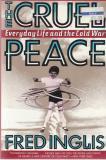Comments
Inglis examines the major confrontations of the postwar years (the Berlin blockade, the Cuban missile crisis et al.) in somewhat far-fetched juxtaposition to certain movies and novels of the time, which, he suggests, "shadowed the action and events of the Cold War." The author argues unconvincingly that the films The Magnificant Seven (1960) and The Manchurian Candidate (1962) "mapped out political conduct and political self-awareness for Cold War soldiers." His sound-and-fury treatise, while intermittently stimulating, is peppered with sentences such as: "The foreign policy of the Reagan years turned out to be an unappetizing mixture of grudging hyper-caution at the arms limitation negotiating tables, reckless and unendearing braggartry in front of the microphones, and minor acts of war and cowardice in about equal proportions." Although fueled by observations from such figures as former British prime minister Denis Healy and American writers Joan Didion and Neil Sheehan, this academic hot-air balloon that never quite gets off the ground. Inglis, a reader in education at the University of Warwick, is the author of Popular Culture and Political Power.
